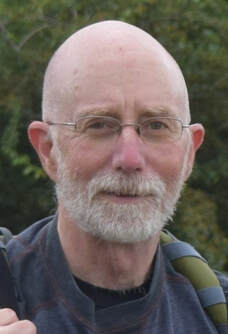Niebuhr was among the first journalists to recognize what political reporters today take as axiomatic: despite the waning influence of mainline denominations, religious belief plays a central role in American political and civic life. His work helped move coverage of religion out of traditional “church news” columns and onto the front page of national newspapers.
Raised in Arlington, Mass., Niebuhr worked summers during his teen years as a wrangler and horseback riding guide at Ring Lake Ranch, an ecumenical retreat center in Wyoming. After graduating Pomona College in 1977 and earning a master’s in history from Oxford in 1980, Niebuhr began his journalism career in 1980 at the Berkshire Eagle in Massachusetts. He worked at the New Orleans Times-Picayune before lobbying the Atlanta Journal-Constitution - ultimately successfully - to hire him to cover religion and politics in 1986. He not only wrote about the US but also traveled on behalf of the paper to report on the growing influence of evangelicals in Central America and tension between Marxism and Christianity in Cuba.
In successive stints at the Wall Street Journal, the Washington Post and the New York Times and as an occasional guest on National Public Radio, Niebuhr explored the broad impact of religion on society in the U.S. and globally. He interviewed the Buddhist leader Thich Nhat Hanh, explored President Bill Clinton’s use of religious language and interviewed Holocaust survivor Elie Wiesel for a 2000 Turner Classic Movies documentary. In 1994, he swept the top awards given by the Religion Newswriters Association for stories that included an analysis of the tragedy at the Branch Davidian compound in Waco, Texas. “You can’t write about the modern world without knowing about religion," Niebuhr said in 2010 upon receiving the William A. Reed Lifetime Achievement Award.
In 2001, Niebuhr moved to academia as a scholar in residence at the Center for the Study of Religion at Princeton University. In 2004, he joined the faculty of Syracuse University, later becoming an associate professor of religion and the media. He held an honorary doctorate from Elmhurst College, where his grandfather H. Richard Niebuhr served as president, and taught and lectured widely, including at Union and Princeton Theological seminaries, the Chautauqua Institution, the University of California, Santa Barbara, and in Japan for the U.S. Department of State. His October 2011 Harvard Divinity School talk at the centennial celebration of the Andover-Harvard Theological Library testifies to the potential transformative power of dialogue across faiths and political divides that is so needed today.
Niebuhr authored two books. Beyond Tolerance: Searching for Interfaith Understanding in America (Viking, 2008) explored interfaith cooperation in US history, beginning with George Washington’s 1790 letter assuring the members of Touro Synagogue in Newport, R.I. that the “government of the United States gives to bigotry no sanction.” Lincoln’s Bishop: A President, a Priest, and the Fate of 300 Dakota Sioux Warriors (HarperOne, 2014), told the story of the Episcopal prelate who convinced Abraham Lincoln to grant clemency to 265 Sioux men condemned to die by a Minnesota military tribunal.
Niebuhr came from a family that exerted an outsized influence on American religious thought. He was the great-nephew of renowned 20th century theologian Reinhold Niebuhr, the grandson of theologian H. Richard Niebuhr, and the son of Richard R. Niebuhr, a professor at Harvard Divinity School.
A soft-spoken man with a gentle, dry wit, Niebuhr balanced serious intellectual pursuits with warmth and generosity of spirit inherited from his mother Nancy Mullican Niebuhr. His articles included vivid descriptions of a former investment banker stocking an underground bunker with canned squash and gold coins to wait out the coming end of the world and a heated fight between the Vatican and biologists seeking to preserve a rare squirrel.
In 1994, Niebuhr married his former Atlanta Journal-Constitution colleague Margaret Lillian Usdansky, now a sociologist and founding director of the Center for Learning and Student Success at Syracuse University. As Niebuhr told it, the New York Times proposed to him shortly before he proposed to Usdansky, and he turned the Times down until editors there agreed to let him work in Washington while Usdansky completed a master’s degree at Georgetown University. Niebuhr took Usdansky to the Clinton White House, Japan, India, Windsor Castle and Greece. The couple raised two sons: Christopher George Niebuhr, a senior research analyst at Beacon Policy Advisors in Washington, D.C., and Jonathan Richard Niebuhr, a senior at the University of Southern California in Los Angeles.
Beginning in their infancy, Niebuhr took his sons on outings and reporting trips, sharing his love of discovery, reading, and travel with them and creating time and space for Margaret to pursue her research. In the summer of 2007, his family met him in the UK, where he was teaching a summer course. After exploring London museums and the neighborhood where Charles Dickens set Oliver Twist, the family went on to Wales. In 2012, they made their first trip to Argentina.
Despite his illness, diagnosed in 2013, the family continued to travel widely in the U.S. and abroad, to Canada, Patagonia, and Peru. In December 2022, they traveled down the Nile, fulfilling Niebuhr’s lifelong dream of visiting Egypt. Niebuhr also took his sons on solo trips, including to New Hampshire to meet presidential candidates ahead of the 2016 primary (Christopher) and a 79-mile hike in Scotland (Jonathan) in 2017.
Niebuhr is also survived by his sister, Sarah Niebuhr, her husband Lynn Coale, nieces, Katie Jennings and Lisa Coale and their husbands Lance Jennings and Eric Shaeffer. In recent years, Niebuhr drew great joy from exchanging drawings and letters with his grandnieces Analise and Ella Jennings and Maeve Shaeffer and grandnephew Finn Shaeffer.
A memorial service will be held on Dec. 29 at Syracuse University. Donations may be sent to the Finger Lakes Land Trust, https://www.fllt.org/donate/
To send condolences, visit: robertdgrayfuneralhome.com.

